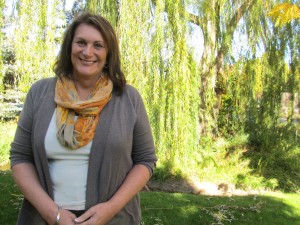“People are often afraid of what they don’t understand. Ignorance can lead to fear, fear to anger, and anger to various forms of oppression.”
That’s Emilie Jackson-Edney—Emi to her friends—a lifetime Boise resident, and Pride Foundation volunteer and board member who has lived as a transgender woman for the last decade: not always easy in a predominantly rural state like Idaho where the “T” in “LGBTQ” remains misunderstood by many.
“Trans people must continually deal with the cultural assumption that they are somehow intrinsically flawed or disordered,” Emi said. “Demonstrating gender traits or identity that challenge expectations inevitably evokes the reaction that something is wrong with them. Most people are not equipped and are uninformed about how to deal with someone who is differently gendered. They just don’t know what to do with us.”
Emi’s gender-transition journey began at the age of 5—her earliest recollection that there was a disconnect between her male birth sex and true female gender mind.
“It didn’t take that young boy very long to understand that to act outside the gender norm was to invite ridicule and violence,” she said. “It was a lonely, frightening, and frustrating experience to be continually told that people like me were an abomination, morally weak, and perverted. I attempted to put away those cross-gender feelings and live my life as male as long as I possibly could in order to protect my deepest, darkest secret.”
In 1968 at 19, Emi married a woman, they raised two children and remained together for 36 years until 2004 when Emi finally decided to disclose her female gender identity.
“I believe I was a good husband, lover, provider, father, brother, son, and friend,” she said. “I did what our society dictates of a male in our culture in order to survive. The reality is that it was like living an uncomfortable lie for me.”
Emi transitioned during her final year of employment for the Ada County Highway District where she started work as a civil engineering designer in 1972.
“Surprisingly, my employer embraced my transition in the workplace and allowed me to complete the final year of my employment with dignity, honor, and acceptance,” she said, “and reinforced the zero tolerance policy toward sexual harassment.” She later became the supervisor of the highway district’s construction division for 21 years, retiring in 2005.
Even with a supportive employer, Emi still encountered much bias from many of her co-workers who she said believed their religious liberties were being infringed upon by being denied the right to actively discriminate against her.
“You learn rather quickly who your friends and enemies are,” she said. “Some of the employees I supervised refused to address me by my new legal name or refer to me in the proper gender pronoun.”
Emi recalled how difficult it was finding resources and support in the Boise area when she began her gender transition process, including medical and psychotherapeutic practitioners, and a welcoming and affirming faith community.
“I was turned down for blood work and cross-gender hormone therapy by three local endocrinologists, even though I had a referral from my physician,” she said. “Their gate keepers informed me that ‘Oh, we don’t treat people like you.’”
Nearly a decade later, Emi believes the support system for the trans community has improved in progressive communities with higher populations, but not so much—if at all—in Idaho’s more conservative rural communities.
“Is it getting better? Yes, but we have a long way to go,” she said. “It’s getting better because trans and gay folks are choosing to be more visible and demanding equal treatment.”
When asked about Transgender Day of Remembrance (marked annually on Nov. 20 to memorialize those who have been killed as a result of anti-transgender violence) and what it means to her, Emi said it is hard to know which emotion is stronger: sadness or anger.
“Seeing our brothers and sisters slaughtered simply for being themselves is something I can imagine happening to my friends or to me,” she said. “If you think about how that name being read this year could be you, a friend, or a family member, it changes you. It makes you realize why ordinary people simply trying to live their lives become passionate activists because someone needs to speak out for these victims, keep their memories alive, and make sure future generations of us don’t face these same horrifying realities.”
Since her transition, Emi has become an outspoken advocate and activist for social justice work in Idaho—particularly LGBTQ-related issues—including efforts to amend the Idaho Human Rights Act and the implementation of citywide anti-discrimination ordinances. She’s most proud of the mentoring work she does within the trans community, such as facilitating trans support groups, talking with mothers of trans kids, educating therapists, and speaking to university classes.
“I believe that I must be visible, and present myself with confidence, dignity, and honor in order to change hearts and minds—one person at a time,” Emi said. “Not many people know someone like me. People have little or no knowledge about the lives and needs of trans people. That’s why I do what I do. If I don’t, who will?”
Her involvement with Pride Foundation as a volunteer, donor, and board member representing Idaho is “a sheer joy,” she said.
“Pride Foundation’s mission to expand opportunities and advance full equality for gay and trans people across the Pacific Northwest, and their vision in which all gay and trans youth, adults and families enjoy the freedom to live safely, openly, and genuinely mirrors exactly how I view my responsibilities to pay it forward. I want to build those bridges of hope for our youth so the dream of full equality becomes a true reality.”
Steve Martin is Pride Foundation’s Regional Development Organizer in Idaho. Email Steve.
